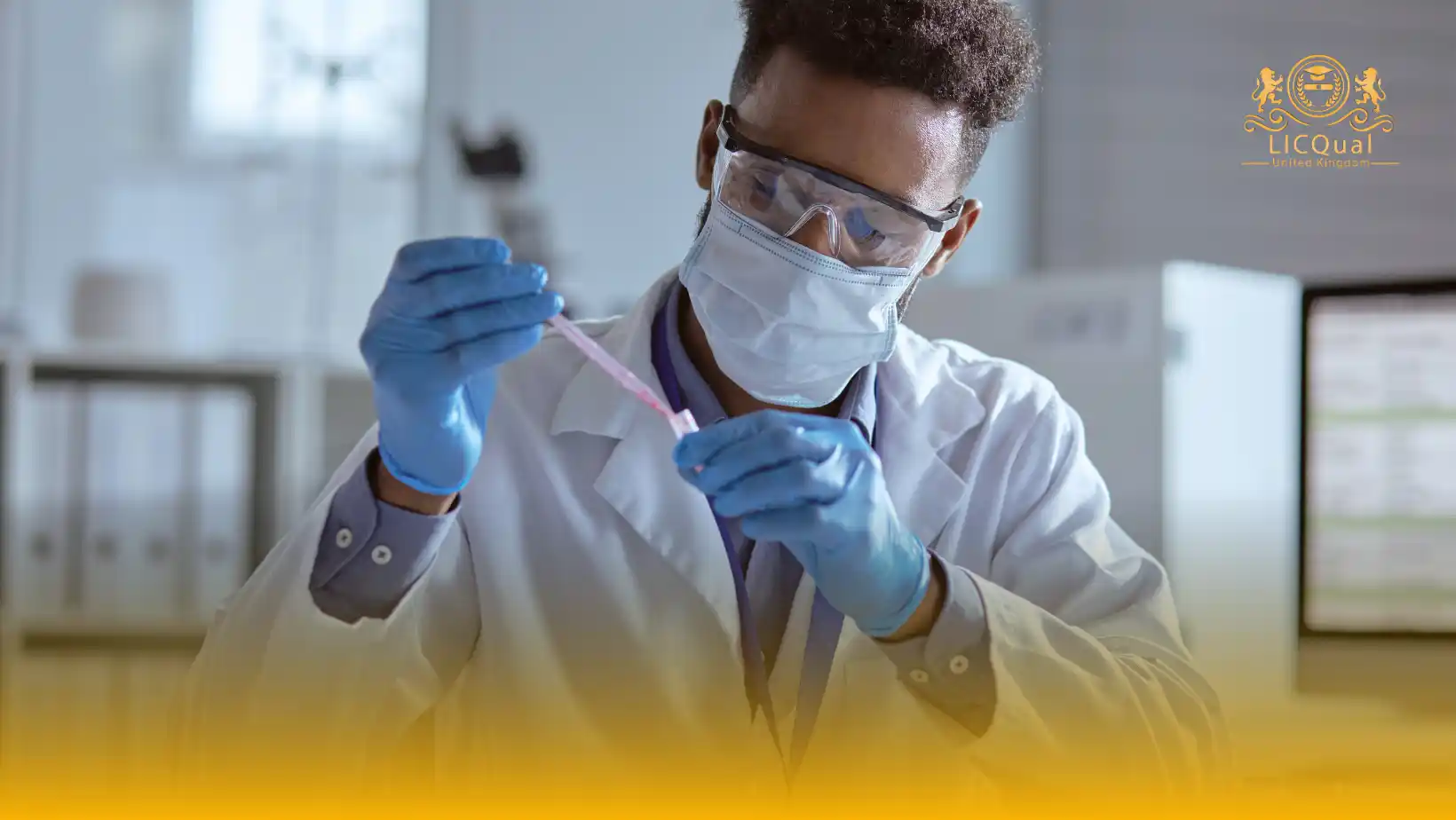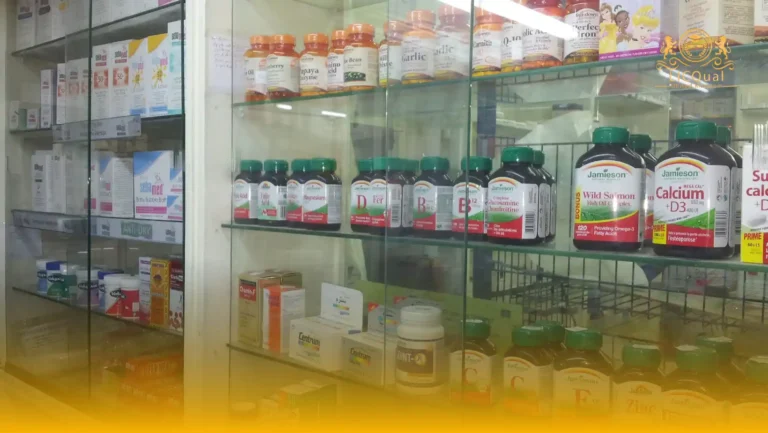The LICQual Level 6 Diploma in Clinical Pathology (Dip CP) is an advanced qualification designed for healthcare professionals seeking to develop specialised expertise in laboratory medicine, diagnostic techniques, and clinical investigation. This diploma provides learners with comprehensive knowledge of laboratory diagnostics, pathology principles, and the application of clinical data to support patient care and evidence-based practice.
This programme is not intended for fresh candidates; it is aimed at medical practitioners, laboratory scientists, and healthcare professionals who wish to enhance their career prospects, expand their scientific knowledge, and strengthen their Continuing Professional Development (CPD). Learners will explore critical areas such as haematology, biochemistry, microbiology, immunology, molecular diagnostics, and clinical data interpretation, equipping them with the skills required for advanced roles in pathology and laboratory medicine.
Centres delivering the LICQual Level 6 Diploma in Clinical Pathology must maintain high standards of training delivery, ensuring learners have access to qualified and experienced staff, current laboratory equipment, and up-to-date academic resources. Practical and case-based learning opportunities, combined with evidence-driven teaching methods, ensure learners develop both theoretical understanding and applied skills.
Completing this diploma enables learners to take on senior clinical, laboratory, or research roles, contribute to the advancement of diagnostic medicine, and support healthcare systems with accurate, reliable, and timely pathology services. It is an ideal pathway for professionals committed to scientific excellence, clinical accuracy, and evidence-based patient care.
Course Overview
Qualification Title
LICQual Level 6 Diploma in Clinical Pathology (Dip CP)
Total Units
6
Total Credits
120
GLH
480
Qualification #
LICQ2200927
Qualification Specification
To enroll in theLICQual Level 6 Diploma in Clinical Pathology (Dip CP), applicants must meet the following criteria:
|
Qualification# |
Unit Title |
Credits |
GLH |
|---|---|---|---|
|
LICQ2200927-1 |
Principles of Clinical Pathology and Laboratory Medicine |
20 |
80 |
|
LICQ2200927-2 |
Haematology and Coagulation |
20 |
80 |
|
LICQ2200927-3 |
Clinical Biochemistry and Metabolic Disorders |
20 |
80 |
|
LICQ2200927-4 |
Microbiology and Immunology |
20 |
80 |
|
LICQ2200927-5 |
Molecular Diagnostics and Advanced Laboratory Techniques |
20 |
80 |
|
LICQ2200927-6 |
Professional Practice, Ethics, and Research in Clinical Pathology |
20 |
80 |
By the end of this course, learners will be able to:
Unit 1: Principles of Clinical Pathology and Laboratory Medicine
By the end of this unit, learners will be able to:
- Critically evaluate the principles and scope of clinical pathology and laboratory medicine.
- Demonstrate understanding of laboratory safety, quality control, and standard operating procedures.
- Interpret laboratory results accurately and assess their clinical relevance.
- Integrate laboratory findings into evidence-based patient management strategies.
Unit 2: Haematology and Coagulation
By the end of this unit, learners will be able to:
- Analyse the structure, function, and pathology of blood cells and haemostatic systems.
- Apply diagnostic techniques to detect and monitor haematological disorders.
- Interpret coagulation profiles and laboratory results for clinical decision-making.
- Develop patient management plans based on haematology findings.
Unit 3: Clinical Biochemistry and Metabolic Disorders
By the end of this unit, learners will be able to:
- Evaluate biochemical markers and their significance in health and disease.
- Apply laboratory techniques to diagnose metabolic, endocrine, and organ-specific disorders.
- Interpret biochemistry results in a clinical context to support patient care.
- Integrate evidence-based approaches in managing biochemical and metabolic conditions.
Unit 4: Microbiology and Immunology
By the end of this unit, learners will be able to:
- Analyse laboratory identification and characterisation of infectious agents.
- Evaluate principles of immunology and immune response monitoring.
- Apply infection control and antimicrobial stewardship practices.
- Interpret microbiology and immunology results to inform clinical decision-making.
Unit 5: Molecular Diagnostics and Advanced Laboratory Techniques
By the end of this unit, learners will be able to:
- Critically evaluate molecular diagnostic techniques including PCR, sequencing, and genetic testing.
- Apply advanced laboratory technologies and automation in diagnostics.
- Integrate molecular findings into clinical practice for patient management.
- Demonstrate competence in using laboratory techniques to support research and clinical decisions.
Unit 6: Professional Practice, Ethics, and Research in Clinical Pathology
By the end of this unit, learners will be able to:
- Apply ethical, legal, and professional standards in laboratory medicine.
- Conduct evidence-based research, audits, and quality improvement initiatives.
- Critically appraise scientific literature to inform laboratory and clinical practice.
- Demonstrate reflective practice and commitment to Continuing Professional Development (CPD).
The LICQual Level 6 Diploma in Clinical Pathology (Dip CP) is designed for healthcare professionals seeking advanced expertise in laboratory medicine, diagnostics, and clinical investigation. This qualification is intended for experienced practitioners aiming to enhance their career prospects, improve patient outcomes, and strengthen their Continuing Professional Development (CPD).
This course is ideal for:
- Laboratory scientists and biomedical scientists looking to specialise in clinical pathology and advanced diagnostic techniques.
- Medical doctors and clinicians aiming to enhance their knowledge of laboratory diagnostics and evidence-based patient care.
- Healthcare professionals in hospital laboratories or research settings who require advanced skills in biochemistry, haematology, microbiology, and molecular diagnostics.
- Nurses and healthcare practitioners involved in diagnostic testing or clinical support roles seeking professional development in pathology.
- Medical educators and researchers focused on laboratory medicine, clinical research, or curriculum development in healthcare.
- Professionals committed to Continuing Professional Development (CPD) who want to remain current with international standards, ethical practice, and evidence-based diagnostics.
- Healthcare leaders and administrators seeking expertise to implement best practices, laboratory protocols, and quality assurance programmes in clinical pathology.
Completing this diploma equips learners with the skills, knowledge, and professional competence needed to deliver high-quality laboratory services, contribute to clinical decision-making, and assume leadership or research roles in diagnostic medicine.
To ensure high-quality training and learner success, centres delivering the LICQual Level 6 Diploma in Clinical Pathology must meet strict standards regarding staff qualifications, resources, and learner support. These requirements are aligned with international best practices in clinical pathology and laboratory medicine education.
Essential Centre Requirements:
- Qualified and Experienced Staff
- Centres must employ instructors and assessors with recognised qualifications and professional experience in clinical pathology, laboratory medicine, haematology, biochemistry, microbiology, or molecular diagnostics.
- Staff should maintain active participation in Continuing Professional Development (CPD) to ensure current knowledge and clinical expertise.
- Comprehensive Learning Resources
- Centres must provide learners with access to updated textbooks, journals, research databases, case studies, and laboratory guidelines relevant to clinical pathology.
- Digital learning platforms, simulation tools, and laboratory facilities should support both theoretical and practical learning.
- Laboratory and Practical Training Facilities
- Centres should provide access to well-equipped laboratories, clinical training environments, or partner healthcare facilities for hands-on experience in diagnostic techniques and laboratory operations.
- Assessment and Quality Assurance Systems
- Centres must implement robust, fair, and transparent assessment procedures aligned with international academic and professional standards.
- Internal verification, moderation, and quality assurance processes should ensure consistency and reliability of learner outcomes.
- Learner Support and Guidance
- Centres must provide academic mentoring, guidance, and career support to help learners achieve their professional goals.
- Clear communication channels should be available for feedback, queries, and learner engagement.
- Compliance and Commitment to Excellence
- Centres must adhere to LICQual policies and maintain high standards of learner welfare, safety, and ethical practice.
- A commitment to continuous improvement in teaching, resources, and learner outcomes is essential.
Meeting these requirements ensures learners acquire advanced expertise in clinical pathology, preparing them for clinical, research, or leadership roles in laboratory medicine and diagnostic healthcare worldwide.
Assessment and Verification
All units within this qualification are subject to internal assessment by the approved centre and external verification by LICQual. The qualification follows a criterion-referenced assessment approach, ensuring that learners meet all specified learning outcomes.
To achieve a ‘Pass’ in any unit, learners must provide valid, sufficient, and authentic evidence demonstrating their attainment of all learning outcomes and compliance with the prescribed assessment criteria. The Assessor is responsible for evaluating the evidence and determining whether the learner has successfully met the required standards.
Assessors must maintain a clear and comprehensive audit trail, documenting the basis for their assessment decisions to ensure transparency, consistency, and compliance with quality assurance requirements.







